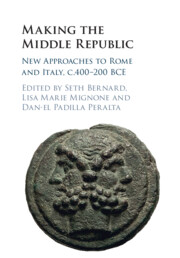Book contents
- Making the Middle Republic
- Making the Middle Republic
- Copyright page
- Contents
- Figures
- Tables
- Charts
- Contributors
- Acknowledgments
- Maps
- 1 Introduction
- Part I Historical Sources
- Part II Material Sources
- 6 The Strangeness of Rome’s Early Heavy Bronze Coinage
- 7 Rural Transformations in Middle Republican Central Italy
- 8 Towards an Agroecology of the Roman Expansion
- Part III Architecture and Art
- Conclusion
- Bibliography
- Index
6 - The Strangeness of Rome’s Early Heavy Bronze Coinage
from Part II - Material Sources
Published online by Cambridge University Press: 20 April 2023
- Making the Middle Republic
- Making the Middle Republic
- Copyright page
- Contents
- Figures
- Tables
- Charts
- Contributors
- Acknowledgments
- Maps
- 1 Introduction
- Part I Historical Sources
- Part II Material Sources
- 6 The Strangeness of Rome’s Early Heavy Bronze Coinage
- 7 Rural Transformations in Middle Republican Central Italy
- 8 Towards an Agroecology of the Roman Expansion
- Part III Architecture and Art
- Conclusion
- Bibliography
- Index
Summary
This chapter revisits the function of Rome’s earliest cast bronze coinages or aes grave (RRC 14, 18, and 19). Primary attention is given to the complex denomination system and new statistical analyses of the weights of known specimens. This new evidence is combined with known find spot data and comparative evidence from aes rude to suggest that the heaviness of these monetary objects met regional cultural expectations while also imitating Greek coinage styles. The chapter also demonstrates that these series are unlikely to conform to different weight standards, being all on a libral standard, with the existence of a so-called “supra-libral” standard being only a misinterpretation of the available data. The degree of variation in the data, with many “overweight” specimens among the lower denominations, strongly suggests that the intrinsic value of the raw materials was secondary to their face value.
- Type
- Chapter
- Information
- Making the Middle RepublicNew Approaches to Rome and Italy, c.400-200 BCE, pp. 103 - 131Publisher: Cambridge University PressPrint publication year: 2023

